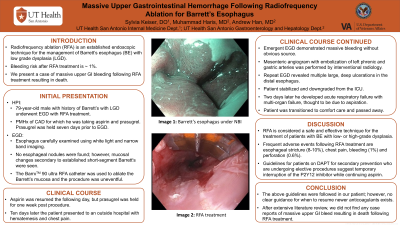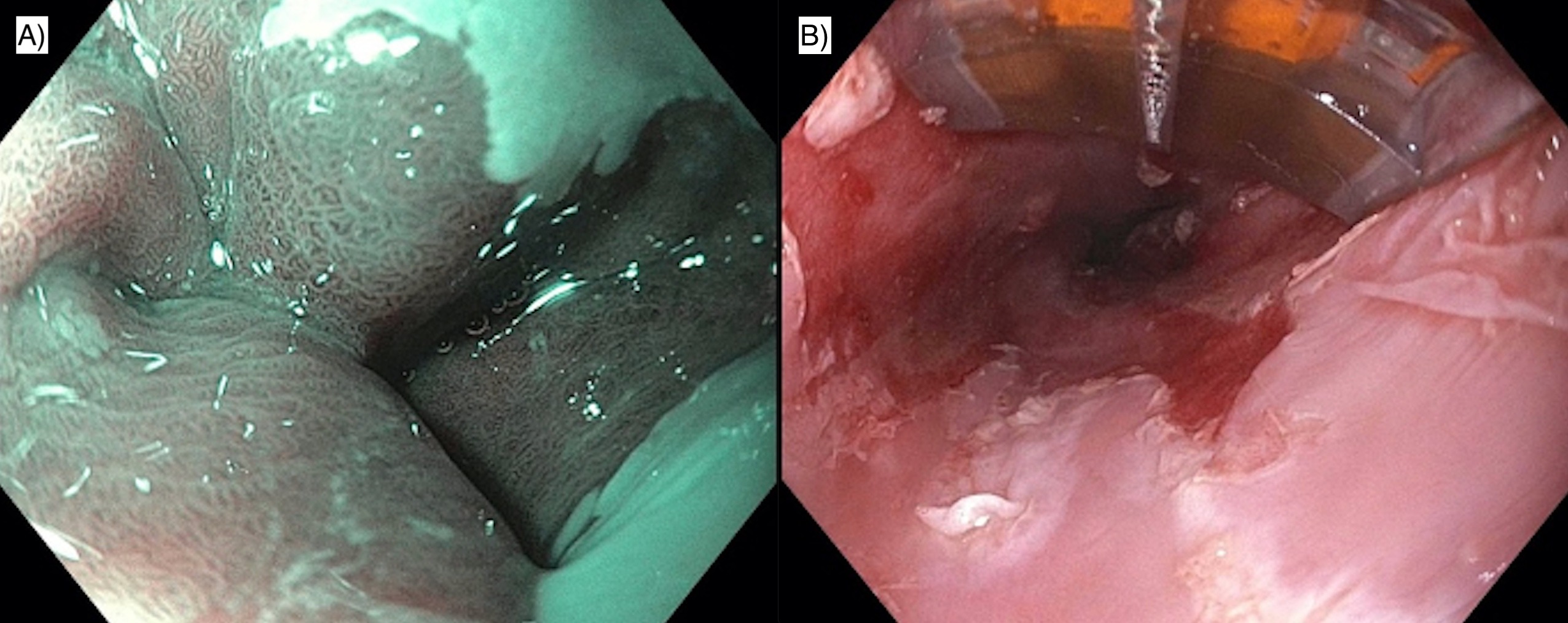Back


Poster Session B - Monday Morning
Category: Esophagus
B0227 - Massive Upper Gastrointestinal Hemorrhage Following Radiofrequency Ablation for Barrett’s Esophagus
Monday, October 24, 2022
10:00 AM – 12:00 PM ET
Location: Crown Ballroom

Has Audio

Sylvia Keiser, DO
University of Texas Health San Antonio
San Antonio, TX
Presenting Author(s)
Muhammad Haris, MD, Sylvia Keiser, DO, Andrew Han, MD
University of Texas Health San Antonio, San Antonio, TX
Introduction: Radiofrequency ablation (RFA) is an established endoscopic technique for the management of Barrett’s esophagus (BE) with low grade dysplasia (LGD). Bleeding risk after RFA treatment has been reported to be around 1%. We present a case of massive upper GI bleeding following RFA treatment resulting in death as an adverse event.
Case Description/Methods: A 79-year-old male with history of BE with LGD underwent esophagogastroduodenoscopy (EGD) with RFA treatment. The patient had a history of coronary artery disease for which he was taking aspirin and prasugrel. His prasugrel was held 7 days prior to the procedure. During the procedure, the esophagus was carefully examined using white light and narrow band imaging. No esophageal nodules were found; however, mucosal changes secondary to established short-segment Barrett's were seen. The BarrxTM 90 ultra RFA catheter was used to ablate the Barrett’s mucosa and the procedure was uneventful. Aspirin was resumed the following day, but prasugrel was held for 1 week post procedure. Ten days post procedure, the patient presented to an outside hospital with hematemesis and chest pain. An emergent EGD was performed that revealed massive bleeding in the esophagus with no obvious source. A mesenteric angiogram with embolization of left phrenic and gastric arteries was performed by interventional radiology. A subsequent EGD revealed multiple large, deep ulcerations in the distal esophagus. The patient stabilized and was downgraded from the ICU. However, 2 days later, the patient developed acute respiratory failure with multi-organ failure, thought to be due to aspiration. The patient was transitioned to comfort care and passed away.
Discussion: RFA is considered a safe and effective technique for the treatment of patients with BE with either low- or high-grade dysplasia as it is associated with an increased risk of developing esophageal adenocarcinoma. The most frequent adverse events following RFA treatment are esophageal stricture (8-10%), chest pain, bleeding (1%) and perforation (0.6%). Current guidelines for patients on dual antiplatelet therapy for secondary prevention who are undergoing elective procedures suggest temporary interruption of the P2Y12 inhibitor while continuing aspirin. These guidelines were followed in our patient. However, no clear guidance for when to resume newer anticoagulants exists. After extensive literature review, we did not find any case reports of massive upper GI bleed resulting in death following RFA treatment.

Disclosures:
Muhammad Haris, MD, Sylvia Keiser, DO, Andrew Han, MD. B0227 - Massive Upper Gastrointestinal Hemorrhage Following Radiofrequency Ablation for Barrett’s Esophagus, ACG 2022 Annual Scientific Meeting Abstracts. Charlotte, NC: American College of Gastroenterology.
University of Texas Health San Antonio, San Antonio, TX
Introduction: Radiofrequency ablation (RFA) is an established endoscopic technique for the management of Barrett’s esophagus (BE) with low grade dysplasia (LGD). Bleeding risk after RFA treatment has been reported to be around 1%. We present a case of massive upper GI bleeding following RFA treatment resulting in death as an adverse event.
Case Description/Methods: A 79-year-old male with history of BE with LGD underwent esophagogastroduodenoscopy (EGD) with RFA treatment. The patient had a history of coronary artery disease for which he was taking aspirin and prasugrel. His prasugrel was held 7 days prior to the procedure. During the procedure, the esophagus was carefully examined using white light and narrow band imaging. No esophageal nodules were found; however, mucosal changes secondary to established short-segment Barrett's were seen. The BarrxTM 90 ultra RFA catheter was used to ablate the Barrett’s mucosa and the procedure was uneventful. Aspirin was resumed the following day, but prasugrel was held for 1 week post procedure. Ten days post procedure, the patient presented to an outside hospital with hematemesis and chest pain. An emergent EGD was performed that revealed massive bleeding in the esophagus with no obvious source. A mesenteric angiogram with embolization of left phrenic and gastric arteries was performed by interventional radiology. A subsequent EGD revealed multiple large, deep ulcerations in the distal esophagus. The patient stabilized and was downgraded from the ICU. However, 2 days later, the patient developed acute respiratory failure with multi-organ failure, thought to be due to aspiration. The patient was transitioned to comfort care and passed away.
Discussion: RFA is considered a safe and effective technique for the treatment of patients with BE with either low- or high-grade dysplasia as it is associated with an increased risk of developing esophageal adenocarcinoma. The most frequent adverse events following RFA treatment are esophageal stricture (8-10%), chest pain, bleeding (1%) and perforation (0.6%). Current guidelines for patients on dual antiplatelet therapy for secondary prevention who are undergoing elective procedures suggest temporary interruption of the P2Y12 inhibitor while continuing aspirin. These guidelines were followed in our patient. However, no clear guidance for when to resume newer anticoagulants exists. After extensive literature review, we did not find any case reports of massive upper GI bleed resulting in death following RFA treatment.

Figure: A) Barret's esophagus under narrow band imaging
B) RFA treatment
B) RFA treatment
Disclosures:
Muhammad Haris indicated no relevant financial relationships.
Sylvia Keiser indicated no relevant financial relationships.
Andrew Han indicated no relevant financial relationships.
Muhammad Haris, MD, Sylvia Keiser, DO, Andrew Han, MD. B0227 - Massive Upper Gastrointestinal Hemorrhage Following Radiofrequency Ablation for Barrett’s Esophagus, ACG 2022 Annual Scientific Meeting Abstracts. Charlotte, NC: American College of Gastroenterology.
